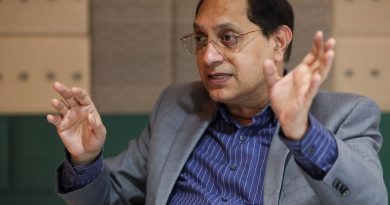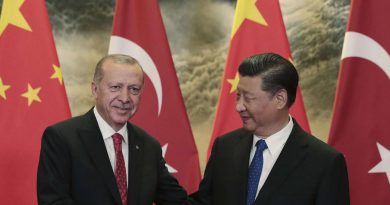Exporting Extremism: How Pakistan Is Using Turkey to Target India
This not only strengthens Pakistan’s foothold in Turkey’s strategic calculations but also aligns with Erdogan’s broader ambitions to lead the Muslim Ummah.
On August 15, 2019, a seemingly emotional piece appeared in a Turkish publication. Written by Ruwa Shah, the daughter of jailed Kashmiri separatist Altaf Ahmad Shah, the article lamented the “besieged” condition of Kashmir, portraying a picture of despair and victimhood. Shah, writing from Turkey, decried the “loss of childhood” among Kashmiri children—despite living thousands of miles away from the region.
While the article may appear at first glance to be a personal narrative, its deeper context and timing are far more consequential. The piece, and many others like it published in Turkish media, reflect an expanding ecosystem of information warfare aimed at maligning India’s global image, particularly in the Muslim world. The source and structure of this narrative appear increasingly tied to a broader project of political Islam, under the leadership of President Recep Tayyip Erdogan.
The Altaf Shah Connection: Terror and Propaganda
Ruwa Shah’s father, Altaf Ahmad Shah, was no ordinary man. He was a key operative in Kashmir’s separatist ecosystem and is currently facing charges in India related to terror financing. India’s National Investigation Agency (NIA) registered a case in 2017 implicating him in illegally raising funds, including through hawala channels, to fuel street violence, destroy schools, and provoke unrest in the Kashmir Valley. His actions, far from the realm of peaceful protest, allegedly contributed to organized violence and efforts to destabilize the region.
Thus, Ruwa Shah’s presence in Turkey and her article in its media cannot be viewed in isolation. It must be seen in conjunction with the growing pattern of Turkish platforms becoming hubs for Pakistani-backed and separatist-driven disinformation campaigns.
A New Axis: Ankara and Islamabad’s Media Alliance
Under President Erdogan’s rule, Turkey has undergone a dramatic transformation—from a relatively secular, pro-Western democracy to a country increasingly under the sway of Islamist populism. Central to this transformation has been Erdogan’s use of media as a strategic weapon—both domestically and internationally.
Analysts have raised concerns that Erdogan’s government has gone beyond domestic control of press freedom and has now adopted a deliberate strategy of international ideological export. Turkish state-run media outlets like Anadolu Agency and TRT, which once hired Western journalists, are now seeing an influx of Pakistani nationals with strong ideological leanings.
Currently, nearly half of the copy-editing staff in Anadolu Agency comprises Pakistani nationals. Many of these journalists have known affiliations with hardline ideologies, and some have shown clear sympathies with separatist movements in South Asia. Turkish media, particularly these two flagship outlets, are now actively providing platforms to voices that echo the narratives of Islamabad and anti-India actors.
ISI’s Invisible Hand?
Foreign policy observers argue that the placement of Pakistani journalists in Turkish media is not merely a reflection of Ankara-Islamabad camaraderie—it may very well be an orchestrated move by Pakistan’s intelligence agency, the ISI. The intent: to amplify Pakistani geopolitical interests, challenge Indian narratives, and use Turkish soft power as a megaphone for radical Islam.
This not only strengthens Pakistan’s foothold in Turkey’s strategic calculations but also aligns with Erdogan’s broader ambitions to lead the Muslim Ummah. It explains why separatists from Kashmir, like Ruwa Shah, are finding Turkish media an inviting space to propagate their agenda.
Erosion of Sufi Pluralism in Turkey
One of the most tragic consequences of this media radicalization is the cultural loss within Turkey itself. Historically rooted in Sufi traditions, Turkish Islam was celebrated for its pluralism and syncretism. However, with the increasing dominance of Pakistani-Deobandi interpretations of Islam—promoted by the new wave of Pakistani journalists and clerics—there is growing concern about an erosion of Turkey’s spiritual heritage.
This ideological shift is being fueled not only through newsrooms but also through Turkey’s expanding religious institutions. The Diyanet, Turkey’s powerful Directorate of Religious Affairs, has witnessed exponential growth in both influence and budget. It is actively promoting a curriculum increasingly aligned with political Islam.
One such example is Erdogan’s controversial move in 2020 to convert Heybeliada Sanatorium—originally a hospital on one of Istanbul’s Princes’ Islands—into a religious school under Diyanet’s control. This follows the pattern of converting key historical monuments like Hagia Sophia and Kariye Church into mosques, symbolic of Erdogan’s Islamization campaign.
Observers worry that Turkey’s religious education sector is now being weaponized to raise generations of youth loyal to a singular, rigid ideological framework—one that is uncritical, conformist, and detached from Turkey’s once-rich theological diversity.
Radicalization of the Marginalized
Erdogan’s strategy doesn’t target the elite. Instead, his focus is on Turkey’s marginalized and underprivileged communities. For academically weaker students who are unable to get into mainstream education systems, religious schools are increasingly becoming the only option. Many of these schools promote a curriculum that serves political interests rather than religious or moral development.
In the long term, this has the potential to create an entire generation susceptible to radical ideologies and blind allegiance to Erdogan’s leadership. The role of imported media ideologues—especially Pakistani journalists—in this radicalization project cannot be underestimated.
A Caution for Turkish Society
Ruwa Shah’s article may have been a drop in the ocean, but it is emblematic of a larger, more dangerous tide. Turkish media, under Erdogan, is being transformed into a global hub for political Islam. It is actively collaborating with Pakistan’s ideological machinery, offering space to separatists and radicals, while undermining secular, moderate narratives.
The Turkish people—once custodians of a rich, pluralistic Islamic tradition—must now reckon with the possibility that their society is being reengineered. If unchecked, the radicalization of Turkish media and religious institutions could lead to long-term domestic instability and international isolation.
As for the rest of the world, particularly nations grappling with terrorism and separatism, the emerging Ankara-Islamabad axis of ideological influence poses a new frontier in the battle against extremism. What appears on the editorial page may just be a soft echo of a harder, strategic plan being executed in real time.



